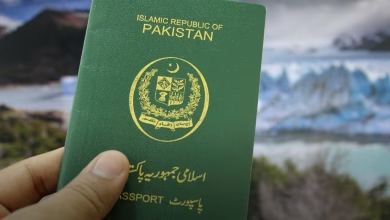A day for children, not for All: Pakistani child domestic workers endure harsh realities
Underage girls and boys work as domestic workers in houses in various districts of Punjab

FORT ABBAS: As the world marks Children’s Day 2025 with the theme of “My Day, My Rights,” the occasion rings hollow for many in Pakistan’s Punjab province, where child domestic workers continue to endure harsh and exploitative conditions.
A total of 39 incidents of violence against domestic workers were reported in the media over the 14 months from April 2023 to July 2024, averaging nearly three cases every month.
Abeera*-14 works as a domestic worker at her landlord’s home in Punjab’s Fort Abbas town. She works from 6 AM till the evening.
Her work is contractual because his family live in the landlord-provided shelter.
“I often face mistreatment from the landlord’s family. I am not even allowed to sit on the bed or a chair. They even make me use separate utensils for meals,” she says.
The domestic worker adds that she is often tortured by the house owner’s wife and daughters, and is frequently accused of theft without any justification.
According to the Women in Struggle for Empowerment (WSE) Punjab chapter, employers abuse, torture, and even kill child domestic workers behind closed doors.
It says Media reports show 39 cases of violence against domestic workers from April 2023 to July 2024, almost three cases every month.
WSE states that employers tortured 11 children to death, raped 5, and brutally beat 23 others.
Employers usually justify their violence with accusations of theft, eating food without permission, or dissatisfaction with the child’s work. WSE also reports that 62% of these child domestic workers are under 15 years old.
The United Nations Convention on the Rights of the Child (UNCRC) 1989 is a legally binding international agreement that defines the civil, political, economic, social, and cultural rights of every child. It provides a comprehensive framework for national and international action on children’s rights, outlining the responsibilities of governments, communities, and individuals to respect, protect, and fulfill those rights.
Child domestic workers (CDWs) represent a significant portion of child labourers in Pakistan, often
working within homes and thus remaining a “hidden phenomenon.” They perform domestic tasks in third-
party homes, with or without pay, differ from children doing chores in their own homes.
They perform various tasks, including cleaning, cooking, and babysitting, often facing harsh conditions, long hours, and restricted freedoms, akin to slavery. Many CDWs start as young as six, particularly girls, who often begin working with their mothers before taking on independent roles by age ten.
They are exposed to numerous risks like electrical hazards, burns, and respiratory issues from dust. Abuse is rampant, with significant numbers of CDWs suffering violence, including severe physical and sexual abuse, sometimes leading to death.
The Labour Force Survey (LFS) 2014–15 provides important insights into child labour in Pakistan, although it only covers children aged 10 to 17, excluding younger children aged 6 to 9 who are also engaged in work. The survey estimated that around 12.5 million children in this age group were involved in child labour.
In comparison, the International Labour Organization (ILO) estimated in 2004 that 264,000 children were engaged specifically in domestic work in Pakistan, while in 2015, 8.5 million people were employed in domestic work nationwide.
A recent study indicates that one in every four households employs a domestic worker, usually a female child aged 10 to 14. Based on an estimated 32.2 million households in Pakistan in 2017, this suggests that approximately 8 million households employ domestic workers, mostly female children.
Survey indicators for child labour vary across regions. For example, the Punjab Child Labour Survey (2019-20) covers children aged 5 to 14, while the Khyber Pakhtunkhwa (KP) Child Labour Survey (2022) includes children aged 5 to 17.
According to compiled estimates, Pakistan has a significant child labour population, with roughly 12.5 million children employed, of whom 61% are boys aged 10 to 14, and 88% live in rural areas. Additionally, around 22.8 million children aged 5 to 16 and about 39% of this age group are out of school.
Child Labour in Pakistan Remains a Serious Concern
According to Punjab Child Labour Survey (PCLS) 2019-2020, child labour continues to affect millions of children across Pakistan, with boys facing significantly higher risks than girls. Recent data shows that 13.4% of children aged 5 to 14 and 16.9% of children aged 5 to 17 are engaged in work. Among these, boys are far more likely to work than girls, with 16.8% of boys aged 5 to 14 and 21.8% of boys aged 5 to 17 involved in child labour, compared to 9.7% and 11.5% of girls in the same age groups.
Many children in Pakistan face hazardous conditions, work long hours, or are subjected to abuse at their workplaces.
Nearly half of children aged 10 to 14 work in dangerous environments, while others work at night, for excessive hours, or with hazardous tools and machinery. Some children also experience psychological, physical, or sexual abuse, highlighting the severe risks faced by child workers.
Child labour prevalence varies across the country. Among divisions, Sahiwal records the highest rate for children aged 5 to 14, while Rawalpindi reports the lowest.
At the district level, Pakpattan has the highest prevalence, whereas Attock has the lowest. Most child labourers work as unpaid family workers, with girls more likely than boys to take on these roles.
Agriculture, forestry, and fishing remain the dominant sectors employing child labourers, followed by water supply and manufacturing.
Boys are more often found in service and sales jobs, while girls are concentrated in agricultural roles. The median hours children work also increase with age, ranging from four hours per week for children aged 5 to 9, to 12 hours for those aged 10 to 14, and 34 hours for adolescents aged 15 to 17.
These figures reveal the ongoing challenge of child labour in Pakistan, particularly in rural areas and the agriculture sector, and underscore the urgent need for stronger enforcement of child protection laws and education initiatives.
This year, as UNICEF issued a Theme 2025 for World Children’s Day is “my day, my rights”.
It says, “We’re encouraging the world to actively listen to children to understand what their lives are like, and how their rights are present, missing or pursued every day, promoting children’s right to participation. Children should be empowered to voice their opinions about the world they want to live in, and it’s all of our responsibility to listen and support their visions,”.
Executive Director of WISE, Bushra Khaliq, told that children below the legal working age continue to be employed as domestic workers, and the number of cases involving physical abuse and exploitation is rising.
“The situation for child domestic workers is dire in every possible way. The authorities remain reluctant to take action, and the situation will not improve unless employing children in domestic work is criminalized,” she added.
She further explained that between April 2023 and July 2024, the media reported a total of 39 incidents of violence against domestic workers, averaging almost three cases per month. Of these, 33 victims (85%) were female and 6 (15%) were male. During this period, 11 child workers were tortured to death, 5 were raped, and 23 were physically beaten, causing injuries.
The majority of cases, 70%, were reported to the police, but most were hushed up, with no tangible action taken except in a few high-profile incidents.
The main triggers behind the violence were allegations of theft and eating food without the employer’s permission. Regarding age, 24 of the victims (62%) were below 15 years old, she said.
LEGAL PERSPECTIVE:
Punjab introduced the Punjab Domestic Workers Act of 2019, which prohibits the employment of children under 15 in domestic work and provides for the regulation of working hours and social security access for adult domestic workers, but the authorities still failed to implement the law.
Like Abeera, there are thousands of child domestic workers in parts of Punjab province who continue to face hardships, mistreatment and even physical torture.
According to the State of Children in Pakistan 2024 report, NCRC’s proposed amendments to the Pakistan Penal Code (PPC) would add a new Section 374A, criminalizing child domestic labour, and Section 374B, holding parents/guardians accountable.
The proposed penalties include 3–7 years in prison and fines of at least PKR 100,000.
Experts like Barrister Rida Tahir, a gender and child-rights specialist, have called for making child domestic labour a cognizable, non-compoundable offence. She also highlights the need to clarify “light work” definitions and align domestic labour laws with international standards.
Senior lawyer, Rida Tahir says child domestic workers are vulnerable to hazards such as carrying heavy tools, handling dangerous items like knives and hammers, using the stove to make tea, and using toxic chemicals to clean. They do not have defined working hours and are unable to access education and healthcare. Moreover, children working as domestic labourers are at risk of malnourishment, unreasonable confinement to the premises of the employer, and sexual abuse.
She highlighted that in Punjab and the Islamabad Capital Territory (ICT), Section 3 of the Punjab Domestic Workers Act, 2019 and the Islamabad Capital Territory Domestic Workers Act, 2022 prohibit the employment of children under the age of 15 (Punjab) and 16 (ICT) years from working in a household in any capacity. The two laws mirror each other to a significant extent. For example, both laws mandate “…dignified working conditions and occupational safety and health measures’’ under Section 4 titled, ‘Rights and entitlements of domestic workers’.
Ms Rida Tahir urged the authorities to implement these laws and protect the rights of child domestic workers and secure their lives, health.
Rights activists in Pakistan also emphasized the need to finalise the law to criminalise child domestic labour to curb this slavery-like practice in the country, which is exploitative in nature.





